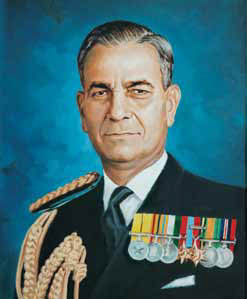Sourendra Nath Kohli facts for kids
Quick facts for kids
Admiral
Sourendra Nath Kohli
PVSM
|
|
|---|---|

Admiral S.N. Kohli
(pictured wearing Vice Admiral's insignia as Commandant, NDC) |
|
| Born | 21 June 1916 Amritsar, Punjab |
| Died | 21 January 1997 (aged 80) |
| Allegiance | |
| Service/ |
|
| Years of service | 1936–1976 |
| Rank | |
| Commands held | Western Naval Command Indian Fleet INS Mysore (C60) INS Rana (D115) |
| Battles/wars | World War II Liberation of Goa Indo-Pakistani War of 1965 Indo-Pakistani War of 1971 |
| Awards | |
| Other work | Author, We dared Author, Sea power and the Indian Ocean |
Admiral Sourendra Nath Kohli (born June 21, 1916 – died January 21, 1997) was a very important leader in the Indian Navy. He served as the 8th Chief of the Naval Staff (the top leader of the Navy) from 1973 to 1976. During the Indo-Pakistan War of 1971, Admiral Kohli was in charge of the Western Naval Command. He successfully led the Indian Navy's Western Fleet in daring attacks called Operation Trident and Operation Python against the Pakistan Navy in Karachi. He also commanded important ships like INS Mysore (C60) and INS Rana (D115).
Contents
Early Life and Education
Sourendra Nath Kohli was born on June 21, 1916. His father was B. L. Kohli. He went to St. Stephen's College in Delhi, where he earned his degree.
Early Career Steps
After finishing college, Kohli joined the Royal Indian Navy Volunteer Reserve in May 1936. This was the Navy of India when it was under British rule. He became a sub-lieutenant in 1938 and was promoted to lieutenant in 1941.
During World War II, Kohli served in different parts of the world, including the Persian Gulf and the Far East. He became a specialist in communications in the United Kingdom in 1943. He also served on a famous ship called HMS Queen Elizabeth (1913) from 1944 to 1945. In 1946, he was promoted to acting Lieutenant Commander.
After India became independent in 1947, Kohli chose to join the new Indian Navy. He was one of the key officers chosen to help the Navy grow. In 1948, he went to the United Kingdom to help buy new destroyers (a type of warship). He became the Commanding Officer of INS Rana (D115) in 1949, after India bought it from the Royal Navy. He was promoted to acting commander that same year.
Kohli held many important positions. He was the Senior Officer of INS Godavari (D92), which was a flagship (a ship used by a commanding officer). Later, he also commanded INS Mysore (C60), another flagship. He became a full commander in 1951 and a captain in 1955.
He also worked as the superintendent of the Naval Dockyard in Bombay (now Mumbai). He was also the Director of Naval Plans twice, helping to plan the Navy's future.
Reaching High Ranks
In 1965, Kohli reached the rank of Rear Admiral. From 1967 to 1969, he was the Flag Officer Commanding of the Fleet, meaning he was in charge of all the Navy's ships. He received the Param Vishisht Seva Medal in 1968 for his excellent service. In 1969, he was promoted to Vice Admiral. After that, he served as the Commandant of the National Defence College for two years.
On February 12, 1971, Admiral Kohli was put in charge of the Western Naval Command. This was a very important role, especially with the war with Pakistan approaching. During the war in December 1971, Admiral Kohli showed amazing leadership. He guided the Indian Navy's powerful attacks on Karachi harbour. He also made sure that Indian Naval bases on the west coast were safe. He was also responsible for protecting Indian merchant ships during the war. For his outstanding leadership during the 1971 war, he was awarded the Padma Bhushan, one of India's highest civilian awards.
On March 1, 1973, Admiral Kohli became the Chief of the Naval Staff, the highest position in the Indian Navy. He retired from the Navy on February 29, 1976.
After Retirement
After retiring, Admiral Kohli wrote two books. One was called We Dared, which was about the Indian Navy's operations during the 1971 war. His other book, Sea Power and the Indian Ocean, looked at the importance of the Indian Ocean for global power and safety.
Family Life
Admiral Kohli was married to Sumitra Kohli. They had three daughters.
 | Victor J. Glover |
 | Yvonne Cagle |
 | Jeanette Epps |
 | Bernard A. Harris Jr. |

